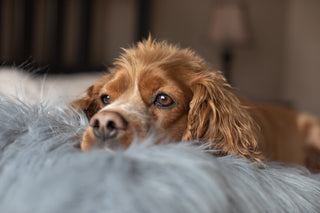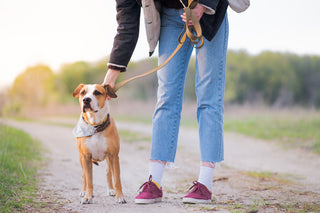Dogs are known for their loyalty and affectionate nature, making them wonderful companions for many people. However, just like humans, dogs can experience anxiety and stress, and one common manifestation of this is separation anxiety. If you've ever come home to find your furniture destroyed or received complaints from your neighbors about incessant barking when you're away, your dog might be struggling with separation anxiety. But don't worry; you're not alone, and there are steps you can take to help your furry friend feel more at ease when you're not around.
Understanding Separation Anxiety
Separation anxiety in dogs is a condition where a dog becomes exceedingly anxious and distraught when parted from their owner or left alone. This anxiety can manifest through various behaviours, including destructive chewing, excessive barking or howling, soiling the house, and attempts to escape. It's vital to recognise that your dog's actions are not born out of malice but rather a consequence of their distress and insecurity when left unaccompanied.
Identifying the Telltale Signs
The first step towards effectively addressing separation anxiety is recognising the signs. Some common indicators include:
- Destructive behaviour: Your dog may gnaw at furniture, shoes, or other items.
- Excessive barking or howling: Neighbours may voice concerns about the noise when you're not present.
- Soiling the house: Dogs with separation anxiety may urinate or defecate indoors.
- Restlessness or pacing: Restlessness signifies anxiety and can manifest as incessant pacing.
- Escape attempts: Certain dogs may endeavour to break free from the house or their crate when left alone.
Steps to Assist Your Dog with Separation Anxiety
-
Seek Professional Guidance: The initial step in managing your dog's separation anxiety is to consult an experienced dog trainer or a veterinarian. They can diagnose the condition's severity and propose a tailored treatment plan.
-
Gradual Desensitisation: Gradually acclimate your dog to your departures. Begin by leaving for brief intervals and gradually extend the duration of your absence. This aids in boosting your dog's confidence and lessening anxiety.
-
Establish a Secure Haven: Establish a secure and cosy space for your dog when you're away. This could be a crate or a designated area with their bed and preferred toys.
-
Offer Mental Stimulation: Mental stimulation via puzzle toys, treat-dispensing toys, or interactive games can help occupy your dog's mind and keep them engaged during your absence.
-
Counter-Conditioning: Link your departures with positive experiences. Provide your dog a special treat or toy before you leave and present it to them when you return. This fosters a positive association with your arrivals and departures.
-
Consider Medication: In severe instances, an expert might suggest medication to help manage your dog's anxiety. These should only be utilised under professional supervision.
-
Professional Training: Engage the services of a professional dog trainer with expertise in addressing separation anxiety. They can provide guidance and support tailored to your dog's individual requirements.
Coping with a dog that experiences separation anxiety can be challenging, but with patience, empathy, and the right approach, you can help your beloved companion feel more secure and relaxed when you're not present.
If your dog is struggling with separation anxiety, don't hesitate to reach out for expert assistance. At K9 Club, our team of dedicated professionals is here to help you and your canine companion overcome this challenging condition. We specialise in dog training and walking services, and we're based right here in Warwick, ready to support you and your furry friend on the journey to a happier, more relaxed life together. Remember that each dog is unique, and the severity of separation anxiety can vary, so it's crucial to seek professional counsel to craft a personalised plan for your dog.
Don't let separation anxiety disrupt your dog's well-being or your peace of mind. Contact K9 Club today to schedule a consultation and take the first step toward a harmonious relationship with your beloved pet. Your dog deserves the best care, and we're here to provide it.



